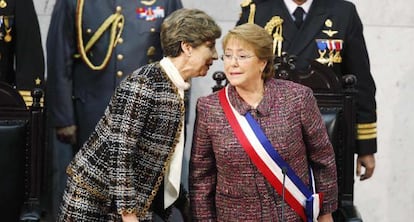Bachelet takes first step toward legalizing abortion in Chile
President calls for lifting of ban on pregnancy terminations when woman’s life is in danger

Two months after taking office, Michelle Bachelet is following through on her campaign promises. She said she would reform the tax code to finance reforms in education, and parliament approved the measure last week. She promised to fight for high-quality public education, and on Tuesday she signed a law to do so. She told her supporters she would decriminalize abortion in rape cases, in situations where the fetus is not viable or the pregnancy threatens the woman’s life. On Wednesday, the president proposed the measure in a speech before Congress.
“Chile has to face this reality by opening an immediate, mature and informed discussion and by taking up a debate in parliament on a measure to decriminalize voluntary abortion in rape cases, when the mother’s life is in danger or when the fetus is not viable,” she said. “Every abortion in this country is a sign that we are, as a society, coming late to this issue because prevention did not have the desired outcome.”
Chile, El Salvador, Honduras, the Dominican Republic and Nicaragua are the only Latin American countries that still hold a full ban on all abortions. In 2012, the Chilean Senate, under the Sebastián Piñera administration, rejected a proposal to debate the issue. Sixty-seven percent of the population considers itself Catholic and marriage between persons of the same sex is not legal.
Chile has to face abortion by opening a mature and informed discussion”
It did not take long for the speech to inspire negative reactions. One of the first criticisms came from Sebastián Piñera via Twitter. “We should protect life and the dignity of all unborn children,” he wrote. “We do not have the right to decide who lives and who dies.” Bachelet hopes that New Majority, the coalition of parties that brought her to power, which runs the gamut from Christian Democrats to Communists, will approve this law and other initiatives she presented on Wednesday.
On May 21, just two months after being sworn in, every Chilean president must deliver a progress report before Congress. He or she details the campaign promises fulfilled and plans for the future. Bachelet focused on education and the economy during her two-hour speech.
Alongside her announcement to decriminalize abortion, the president also proposed a bill to protect glaciers and their surrounding environments – a measure that was enthusiastically supported by Greenpeace. The environmental organization is already behind a campaign to protect 24,114 glaciers in Chile from mining exploration.
Bachelet has been insisting on open dialogue since she was re-elected. “As we debate this and other measures we should all be able to talk about our differences with respect, without veering into caricatures or spreading misinformation among our citizens about the real impact of these proposals.”
Meanwhile, high school and university students marched throughout the city to protest against the education reforms the administration announced last week. They say the measures do not go far enough to secure equal access to public education for all. The march, which was organized by the Chilean Students Confederation (Confech), the workers’ union, and groups that were affected by the fire that burned hillsides in Valparaíso a month ago, began just as Bachelet started to speak.
Translation: Dyane Jean François
Tu suscripción se está usando en otro dispositivo
¿Quieres añadir otro usuario a tu suscripción?
Si continúas leyendo en este dispositivo, no se podrá leer en el otro.
FlechaTu suscripción se está usando en otro dispositivo y solo puedes acceder a EL PAÍS desde un dispositivo a la vez.
Si quieres compartir tu cuenta, cambia tu suscripción a la modalidad Premium, así podrás añadir otro usuario. Cada uno accederá con su propia cuenta de email, lo que os permitirá personalizar vuestra experiencia en EL PAÍS.
¿Tienes una suscripción de empresa? Accede aquí para contratar más cuentas.
En el caso de no saber quién está usando tu cuenta, te recomendamos cambiar tu contraseña aquí.
Si decides continuar compartiendo tu cuenta, este mensaje se mostrará en tu dispositivo y en el de la otra persona que está usando tu cuenta de forma indefinida, afectando a tu experiencia de lectura. Puedes consultar aquí los términos y condiciones de la suscripción digital.








































